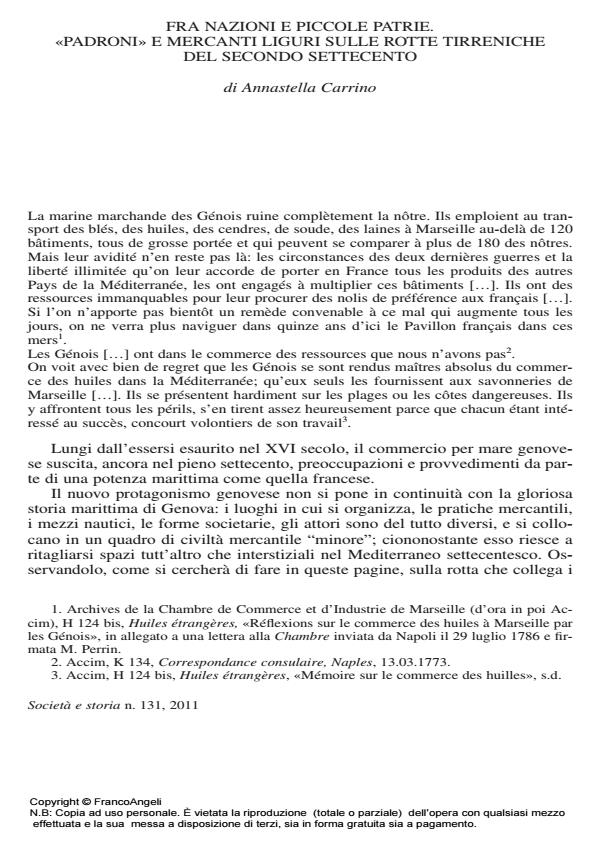Between "nations" and native villages. Liguria’s captains and merchants on the Tyrrhenian routes in the second half of the XVIIIth century
Journal title SOCIETÀ E STORIA
Author/s Annastella Carrino
Publishing Year 2011 Issue 2011/131
Language Italian Pages 32 P. 36-67 File size 738 KB
DOI 10.3280/SS2011-001002
DOI is like a bar code for intellectual property: to have more infomation
click here
Below, you can see the article first page
If you want to buy this article in PDF format, you can do it, following the instructions to buy download credits

FrancoAngeli is member of Publishers International Linking Association, Inc (PILA), a not-for-profit association which run the CrossRef service enabling links to and from online scholarly content.
According to a large part of now-a-day historiography, the XVIIIth century economy is comparable to a mechanism that produces development and, at the same time, control and marginalisation. At the top there are big merchants and states that control production, market, political and military hierarchy, leaving scant spaces to the other subjects, who reach sometimes the upper levels of the market only through "irregular" and fraudulent entrepreneurial behaviours. Following the suggestions of some recent work, the author suggests a different image of the XVIIIth century commercial development in the Mediterranean, in which a large part is plaid by "minor" actors and marginal places who are not able to mobilise significant amount of capital, information, state protection. The Genovesi at the centre of this essay, and at the centre of an important part of the XVIIIth century Mediterranean economy, are not from Genoa, and they have nothing to do with the illustrious early-modern Genoese entrepreneurial and financial tradition. They are micro-merchants, often captains of their own ships, born and grown in tiny seaside villages of the western Riviera of Liguria, who are able to invent new ways to conquer information, trust, capitals, contacts and market spaces. A most important asset in their command is the relationship with their Riviera villages: very weak from the demographic, institutional, financial and commercial point of view, they possess an important "relational" capital largely employed in order to achieve commercial success even in far away important market places. Through a series of individual and group biography, the essay suggests the image of a Mediterranean crowded by actors, practices and places often forgotten in the history books. Leaving them off the picture, we run the risk of misunderstanding the actual working of this late-modern economy in a decisive moment of its growth.
Keywords: 18th century Mediterranean; Maritime commerce; Liguria’s merchants; Genoese consuls; Weak sites; Marseille
- Quale storia della società? Uno sguardo sull'epoca moderna Paola Bianchi, in SOCIETÀ E STORIA 178/2023 pp.711
DOI: 10.3280/SS2022-178005 - Between Misery and Reward: The Culture of Vigilance in the Experience of a Venetian Consul during the Early Modern Period Umberto Signori, in SOCIETÀ E STORIA 177/2022 pp.526
DOI: 10.3280/SS2022-177005 - Passes and Protection in the Making of a British Mediterranean Tristan Stein, in Journal of British Studies /2015 pp.602
DOI: 10.1017/jbr.2015.58
Annastella Carrino, Fra nazioni e piccole patrie. "Padroni" e mercanti liguri sulle rotte tirreniche del secondo settecento in "SOCIETÀ E STORIA " 131/2011, pp 36-67, DOI: 10.3280/SS2011-001002